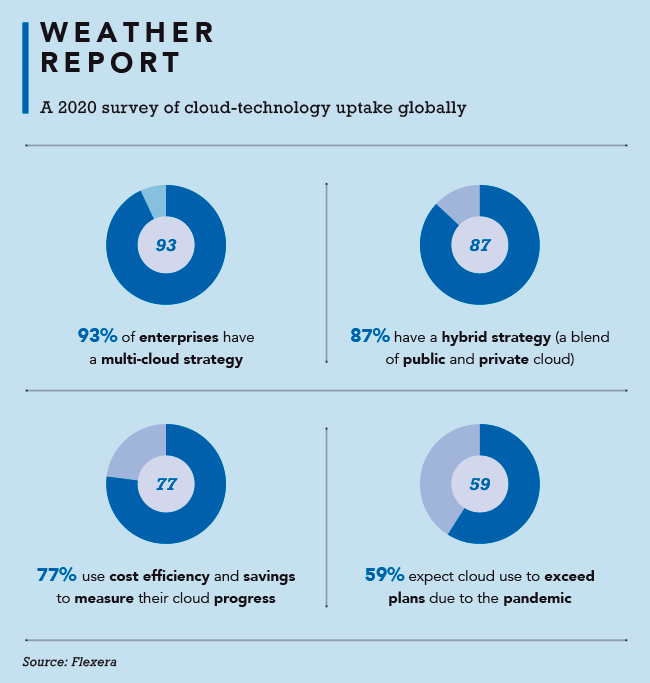Alibaba Cloud’s new cloud computer is something to behold. A small, palm-sized device (the PR fluff says it’s ‘just about 60g and as light as an egg’), it looks nothing like a ‘normal’ computer. It’s shaped more like an external hard drive, yet instead of file storage it offers super-high-performance computing – the kind that can, for example, cut the rendering time of a frame of high-resolution animation from the 90 minutes it would take a traditional PC, down to just 10 minutes. That power comes from its cloud-based back-end, which allows apps and user data to sit securely in the cloud.
The cloud computer is designed to be mobile. The launch video, screened at Alibaba Group’s 12th annual Apsara Conference in September, shows the device connecting – wirelessly, of course – to a range of external devices like monitors, earbuds and VR goggles.
‘We hope our cloud computer can help people access resilient computing power whenever they need to, so they can conduct complex tasks that usually require sophisticated and powerful PCs, such as video editing, animation rendering, software development, and online customer services, with a tiny personal computer at hand now,’ said Jeff Zhang, president of Alibaba Cloud Intelligence. ‘As working from home becomes the new normal during and after the pandemic, we believe our innovation can also help users more easily enjoy the benefits of cloud computing anytime, anywhere, in a cost-effective yet secure way.’
The Alibaba Cloud computer offers a glimpse of what’s about to hit the tech world, as cloud adoption moves into its next phase. And as futuristic as the device may seem (the video is filled with transparent tablets and instant data transfers), the technology to support and enable it already exists, and is currently rolling out across Africa.
Market intelligence firm IDC recently estimated that cloud-computing annual subscriptions in South Africa alone would grow 29% annually, rocketing from US$370 million in 2018 to US$1.7 billion in 2024, while spending on non-cloud software is expected to decrease 4% annually over the same period. At the same time, IDC’s forecasts show that spending on public cloud computing in South Africa being less than 11% of spending on total IT – which suggests a virtually unlimited growth opportunity.
‘With this sanitary emergency, we realised that digital is becoming more and more important,’ says Petra Jenner, Salesforce’s senior VP for Europe, Middle East and Africa Emerging Markets, referring to the COVID-19 pandemic. ‘In fact, according to IDC’s global forecast of today’s market for digital-transformation-related technology, by 2024 nearly 50% of cloud software spending will be tied to digital transformation.’

Those numbers were backed up by the third edition of the Cloud in Africa report, released in September by South African market research firm World Wide Worx in partnership with F5, Digicloud Africa and Dell Technologies. Taking spend as an indication of growth, the report found that 38% of African decision-makers – including a massive 82% in South Africa – increased their cloud services spend in the past year. ‘This has a lot to do with the fact that South Africa has recently experienced a lot of growth in data-centre activity with Microsoft Azure and AWS both opening data centres in the region,’ says World Wide Worx MD Arthur Goldstuck. ‘Naturally, this increases cloud interest and activity.’
To Jenner’s point, so too did COVID-19. More than 90% of the Cloud in Africa’s surveyed respondents said that cloud computing was ‘important’ in their response to the crisis. Cloud was primarily used to boost their businesses’ disaster-recovery (91%), remote-working (obviously, at 82%) and customer-service (52%) efforts.
To further illustrate the growth in African cloud migration, Goldstuck looks back to the first edition of the Cloud in Africa report, released in 2013. Then, about 50% of businesses across South Africa, Kenya and Nigeria were actively using cloud in some form or another. By 2018, when the second edition was released, that had risen to 100%.
‘This doesn’t mean that these businesses were all-in when it comes to cloud,’ says Goldstuck. ‘But it means that they were using the cloud for certain aspects of their business operations.’ And, as he points out, ‘COVID-19 has catalysed decision-makers’ receptivity to the cloud in recent months, but it’s also clear that a significant momentum was already building across Africa’. Even companies that aren’t shifting entirely towards cloud are at least (in many cases) adopting a hybrid model of part-public, part-private cloud technology.

‘[Companies with] smaller compute workloads are cautiously testing the public and private cloud offerings available as the challenging economic times continue to dictate IT OPEX spend,’ says Sean Hackett, MD of South African cloud-solutions provider the Tech Company. ‘When it comes to large infrastructure sets that have been rooted into a network financially and technically, often the cut over to public cloud is a longer process with financial outlooks that are different to the current status quo.’ He says that this, along with ‘a significant lack of critical cloud-computing skills’, is delaying any major increase in the adoption of server-less environments.
Bearing in mind that growth in cloud migration – as well as cool toys such as Alibaba Cloud’s nifty new computer, and the significant news of 20 new data centres expected to come online across the continent in 2020 – the conversation turns from ‘are African companies using the cloud?’ to ‘what benefits are African companies enjoying from using the cloud?’. Here, the World Wide Worx report has some interesting indications.
When asked which applications they’ve already moved to the cloud, the survey participants listed accounting apps and productivity apps such as Office 365. ‘In previous reports, backups were most commonly migrated to the cloud, but this is no longer the case as cloud is increasingly being used to facilitate more operational aspects of the business,’ says Goldstuck. ‘This points to the evolving role of the cloud as a business enabler and a facilitator of remote work and productivity.’ In fact, when those same respondents were asked to name the biggest benefits of cloud technology, most cited business efficiency (63%), agility and operational flexibility (53%) and improved customer service (45%).
Prabashni Naidoo, director of AWS South Africa, added to that list when AWS’s Cape Town data centre went live in April. ‘One of the benefits customers love about AWS is the ability to rapidly experiment, at low cost. Through using AWS, developers are able to test new ideas without any upfront payment or long-term commitment,’ she said.
‘Traditionally, the size of an organisation’s computing capacity had to be matched by the size of the team administrating and supporting it,’ according to Robert Marston, global head of product at Seacom. ‘Moving to the cloud reduces the need for an entire desktop support team, as users are upskilled to understand the new systems and applications themselves. At a small business level, a lot of those skills would have had to be brought in, and finding a reliable IT support partner can be a challenge. The cloud lets smaller businesses access services they wouldn’t have been able to access previously.’

‘The cloud economy is based on a simple consumption-based model: you only pay for what you use,’ he adds. ‘This way, you save money and also gain greater flexibility in being able to scale your needs rapidly up and down – both now and in the future. Gone are the days where a company has either overestimated its growth and over-spent on IT hardware or, conversely, has not anticipated demand and scrambles to procure and install the necessary IT hardware to support it.’
Which brings us back to Alibaba Cloud’s computer. The levels of technology – and of possibility – represented by that powerful little device are an indication of what cloud computing can now offer. And as more data centres roll out across Africa, and more enterprises across the continent migrate to the cloud (public, private, or both), those possibilities only increase. After all, when it comes to cloud, the sky – as they say – is the limit.
By Mark van Dijk
Images: Gallo/Getty Images, Alibaba



